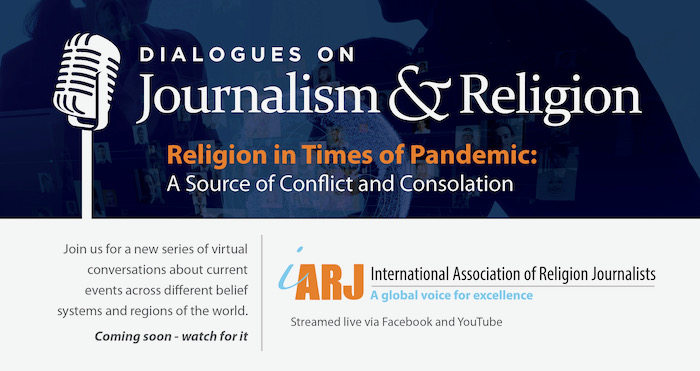Journalisten aus aller Welt diskutierten über Religion und die Pandemie in der ersten Reihe von Online-Dialogen der IARJ

The coronavirus global pandemic poses enormous challenges in terms of health, society, economy, politics and human development to countries and communities across the world. Religion also plays a role in the fight against COVID-19, and both faith communities and religious leaders have shown how relevant they can be during difficult times.
In this context, the International Association of Religion Journalists (IARJ) held a series of online dialogues about how COVID-19 is impacting faith communities in different parts of the world. We brought together journalists from diverse regions to share their stories on faith and coronavirus, and to reflect on how world religions are facing this unusual situation.
All events were live-streamed through the IARJ Facebook page, and all resulting videos can still be watched on the IARJ website www.theiarj.org and on the IARJ Facebook page https://www.facebook.com/The-International-Association-of-Religion-Journalists-926852654019430
The series ran during August, September and October of 2020, with eight regional panels composed of three speakers and a moderator. The featured regions were: Asia (August 18), North America (August 26), Europe (September 1), Latin America (September 16), Mediterranean (September 21), Sub-Saharan Africa (October 1), Asia-Australia (October 8), and Middle East & North Africa (October 13).
All dialogues were held in English, except for the one for Latin America, which was held in Spanish, and the one for Middle East and North Africa, which ran in Arabic.
Among the topics addressed, there is one that stood out in all regional conversations, namely the difficulties of religious practice when communities and temples must abide by strict anti-COVID official regulations, and the flourishing of online religious services as a result. In some regions, this has led to tensions between civil authorities and local religious leaders, and in some cases, even to denial of the scientific danger of the virus by the latter.
Other issues that appeared in the dialogues are: interfaith work and charitable contribution of religions to help people in need during these tough times; misinformation and fake news regarding COVID-19; impact of the coronavirus in migration flows in different countries and seas; loneliness of the faithful during confinement and lockdown; and the effects of the discussions about the pandemic in politics, society and economy of the various countries.
In all, 31 journalists participated in this series. The journalists come from, are based in, or work for media from the following countries (listed in alphabetical order): Algeria, Argentina, Australia, Canada, Cyprus, France, Germany, Greece, India, Indonesia, Israel, Italy, Kenya, Lebanon, Malaysia, Mexico, Nigeria, Norway, Pakistan, Peru, Serbia, South Africa, Spain, Sri Lanka, Syria, Sudan, Turkey, United Kingdom and United States.
The IARJ would like to give special thanks to graphic designer Paul Springer for his contribution to this project.
